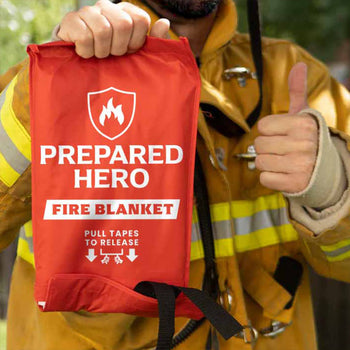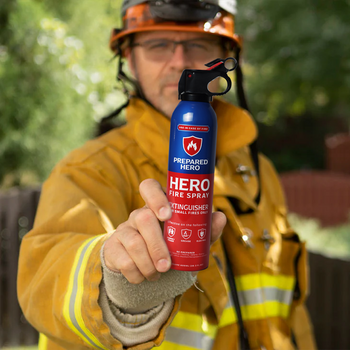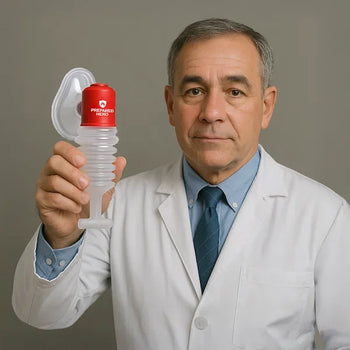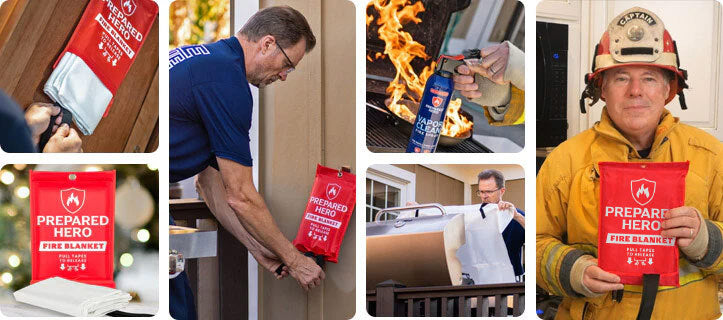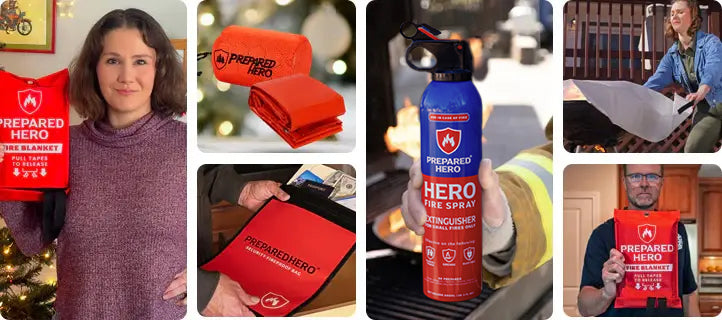Where you put your smoke detectors matters just as much as installing them. Proper placement makes sure they can detect...
Vegetable oil is one of the most popular kitchen ingredients in the world. Whether you're using it to deep-fry chicken or make a salad, vegetable oil makes cooking easier.
But is vegetable oil flammable? Should you be concerned that it'll catch fire? Let's find out.
What Is Vegetable Oil?

Vegetable oil is an umbrella term for oils extracted from plant parts. Common examples of vegetable oil include olive oil, palm oil, soybean oil, and coconut oil.
The term also refers to any liquid vegetable fat at room temperature. As you probably already know, vegetable oils are edible.
They're also light-colored and made as flavorless and odorless as possible. Plus, vegetable oils are generally made by crushing plant matter, then spinning the mixture to separate the oil.
After this, manufacturers distill and refine the oil to remove as many contaminants as possible. Depending on the type of vegetable oil, manufacturers further process it to remove impurities that affect the oil's color, flavor, and aroma.
What Is the Flash Point of Vegetable Oil?

You can heat vegetable oils to higher temperatures than water without boiling them. Because of this, they're suitable for frying.
The said temperature is called the flash point. Once a liquid releases enough vapor to catch fire or spark a flame, it reaches its flash point.
The flash point refers to the cut-off point between a flammable and combustible liquid. According to the Occupational Safety and Health Administration (OSHA), this point is 100 °F or 37.8 °C. This means that anything with a flash point less than 100 °F is flammable.
The average flash point of common vegetable oils such as palm, soybean, and canola oil is 600° F or 315°C.
Is Vegetable Oil Flammable?

Vegetable oil is not flammable, but it can catch fire while cooking.
As mentioned above, a liquid with a flash point of less than 100°F or 37.8 °C is flammable. Since the average flash point of vegetable oil is 600° F or 315°C, it’s not flammable.
But this doesn't mean vegetable oil doesn't burn or ignite. Plus, there are a lot of different vegetable oils in the market, including olive, coconut, soybean, flaxseed, and canola. This means that each one has a different flash point. To help you determine the flash point of common vegetable oils, we compiled them below.
Flash Points of Common Vegetable Oils

Here are the flash points of common vegetable oils:
| Cooking Oil | Flash Point |
| Olive Oil | 410°F |
| Coconut Oil | 563°F |
| Flaxseed Oil | 600°F |
| Safflower Oil | 600°F |
| Sesame Oil | 600°F |
| Cottonseed Oil | 606°F |
| Sunflower Oil | 607°F |
| Palm Oil | 615°F |
| Rice Bran Oil | 615°F |
| Corn Oil | 617°F |
| Canola Oil | 619°F |
| Soybean Oil | 626°F |
| Peanut Oil | 633°F |
Is Vegetable Oil Combustible?

Yes, vegetable oil is combustible. According to OSHA's fact sheet, combustible liquids have flash points above 100°F or 37.8 °C.
Since vegetable oil has an average flash point of 600° F or 315°C, it is combustible. This means that vegetable oil can come to a point where the vapor it gives off can ignite when mixed with air.
Can Vegetable Oil Catch Fire?

Yes, vegetable oil can catch fire and burn. As a result, it can cause significant damage at home. In fact, kitchen fires are the leading cause of home fires in the United States and the second leading cause of home fire deaths.
It also doesn't take long for vegetable oil to reach its flash point and catch fire. Given this, you must use vegetable oil safely to prevent fire outbreaks.
Can Vegetable Oil Spontaneously Combust?

Yes, vegetable oil can spontaneously combust once it oxidizes and gets exposed to air. In some cases, dried vegetable oil on rags combusts.
However, vegetable oil doesn't spontaneously combust when stored in a properly sealed bottle. Despite this, many people don't store vegetable oil properly. Some leave them out in pans or pots, while others don't close the cap tightly after cooking.
Don't be like them. Close the cap tightly and never leave vegetable oil unattended, even if it has cooled down.
How to Use Vegetable Oil Safely

Prevention is always better than cure, and we can't stress this enough. Here are some tips to prevent grease fires in the kitchen:
- Don't leave the stove, oven, fryer, or other cooking appliances unattended while they're on.
- Turn off the heat if you see smoke coming from the vegetable oil.
- Carefully put food in hot vegetable oil.
- Never put frozen food in hot vegetable oil.
- Don't leave the kitchen until you've finished cooking, and let the hot kitchen equipment cool down.
- Remove moisture from food before putting it in hot vegetable oil.
- Don’t overheat the oil.
- Thoroughly clean your oven, pans, and pots after cooking so they don't accumulate grease.
- Don't keep flammable substances like flour or sugar near heat sources.
- Always keep a fire extinguisher or fire spray in your kitchen.
- Have a working fire sprinkler system in your kitchen.
- Invest in a kitchen fire suppression system if you can.
What to Do If Vegetable Oil Catches Fire

- Turn the heat off.
- Cover the pot with a metal lid.
- Use a fire extinguisher or spray.
Here's what you need to do when vegetable oil catches fire:
1. Turn the heat off.
Immediately turn the heat off once you see or smell smoke from the vegetable oil.
2. Cover the pot with a metal lid.
Don't move the pot or pan. You might splash the burning oil and cause injuries. Cover the pot or pan with a metal lid instead. Doing this starves the fire of oxygen, eventually putting out the fire.
3. Use a fire extinguisher or spray.
A fire extinguisher should be your last resort because it will contaminate your kitchen. Still, it's better to use it than not put out the fire.
While a fire extinguisher helps, it’s bulky, expensive, and heavy. Use a fire spray if you want a lightweight and more affordable alternative.
The Prepared Hero Fire Spray is an easy-to-use alternative to fire extinguishers. It will help you deal with minor fire accidents and stop them before they turn into massive disasters.

Here's a table summarizing the differences between Prepared Hero's fire spray and a regular fire extinguisher:
| Prepared Hero’s Fire Spray | Regular Fire Extinguisher |
| Lightweight, easy to carry | Heavy, hard to carry |
| Easy to store | Needs more space for storage |
| 100% biodegradable | Mostly made of non-biodegradable materials |
| Non-toxic | Toxic |
| Easy to clean | Hard to clean |
| Safe for kids and pets | Not safe for kids and pets |
Frequently Asked Questions
Is vegetable oil a flammable liquid?
Vegetable oil is not a flammable liquid. According to OSHA, flammable liquids have flash points below 100°F or 37.8 °C. Since vegetable oil has an average flash point of 600°F, it is not flammable. However, vegetable oil can catch fire and burn.
Can vegetable oil self-ignite?
Yes, vegetable oil can self-ignite once it oxidizes and gets exposed to air. Dried vegetable oil can also ignite on rags, though rare. Hence, you must be extremely careful and practice preventive measures when using vegetable oil.
Is it safe to burn vegetable oil?
No, it is not safe to burn vegetable oil. Burning vegetable oil can cause fire and respiratory issues, because the oil's molecular breakdown can release inflammatory free radicals and a carcinogenic compound called acrolein.
Why is vegetable oil not flammable?
Vegetable oil is not flammable because its flash point is over 100°F or 37.8 °C. According to the OSHA, liquids with flash points below 100°F or 37.8 °C are flammable. Since vegetable oil's flash point exceeds this temperature, it is not flammable.
What oils are not flammable?
Non-flammable oils include vegetable oils such as olive, soybean, canola, olive, and coconut and standard motor oils. They're not flammable because their flash points are more than 100°F or 37.8 °C.
Conclusion

Don't let vegetable oil fool you. While it's not technically flammable and doesn't ignite as easily as gasoline, it can still set your kitchen ablaze.
For this reason, you must handle your vegetable oil carefully and keep it away from heat sources when not in use.
And in case of an emergency, make sure you have a fire prevention kit on hand. Remember, a fire spray and fire blanket can mean the difference between a minor mishap and a burned down house.
Stay prepared and safe by getting fire safety tools from Prepared Hero now!


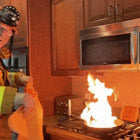 Fire
Fire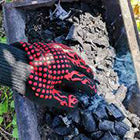 Safety
Safety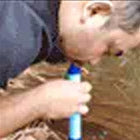 Survival
Survival Protection
Protection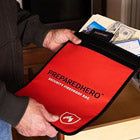 New
New
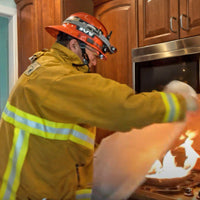 Fire
Fire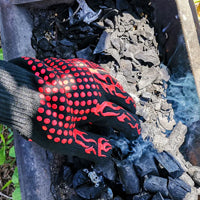 Safety
Safety Survival
Survival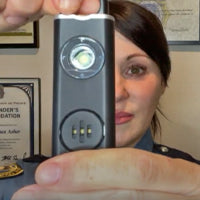 Protection
Protection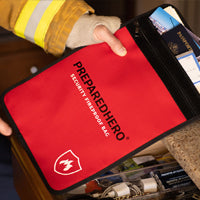 New
New
